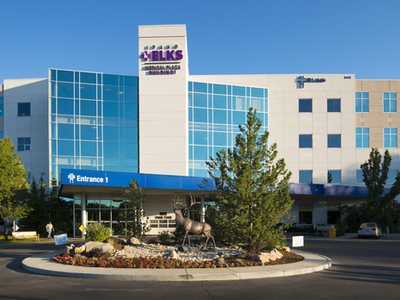
Driving Rehabilitation Program

Driving Rehabilitation Program
Helping Prepare Safe Drivers
St. Luke’s Driving Rehabilitation Program is committed to providing high-quality, personalized evaluations led by a licensed occupational therapist with specialized training in driving rehabilitation.
Our comprehensive assessment process is designed to evaluate driving-related risks, determine readiness to start, resume, or continue driving, and offer clear recommendations when driving may no longer be safe. Whether you're recovering from an injury, managing a medical condition, or navigating age-related changes, our goal is to support your safety, confidence, and independence on the road.
What to Expect
A 90-min clinical assessment of visual, perceptual, motor, and cognitive skills performed by an occupational therapist who is a driving rehab specialist (DRS).
This assessment tests the basic skills a person needs to be a safe driver. A person’s risk of having a potential motor vehicle accident is determined through this assessment.
The testing will help predict how a person will react on-the-road in real-life driving situations. Immediate results and recommendations are provided at the end of the appointment.
Participation Requirements
- A signed order or referral for a comprehensive driving evaluation from a physician (MD/DO), nurse practitioner (NP) or certified physician's assistant (PA-C). Please send chart notes from the last 6 months supporting diagnosis.
- A current driver’s license/permit for on road driving evaluation
Please fax driving evaluation referrals to (208) 493-2988 or call (208) 385-3232.
Appropriate Timing for a Driving Evaluation
If a person has experienced a medical event resulting in a neurological injury or shows signs of decline, affecting cognition, vision and/or motor skills due to aging or illness a driving evaluation may be appropriate. If the physician has concerns about a person’s readiness to resume driving, they should be evaluated once they meet the following prerequisites:
- When they are medically stable
- Seizures are controlled and no seizure activity in the last 3 months
- When recommended by a physician or treating occupational therapist
- When maximum rehabilitation has occurred
- When they are independent with their basic ADLs
- When they have mastered transferring between surfaces
- When they are emotionally/psychologically ready
Inappropriate Referrals
- A person who is unable to care for themselves, requires assistance with mobility and/or transfers, or is medically compromised
- A person who does not have a valid driver’s license or legal matters regarding the status of their license except for teen drivers (see below)
- A person with psychiatric and/or mental health issue not currently managed by a medical provider
- A person who is being prescribed medication with side effects impacting cognition or ability to drive (narcotics/opioids)
